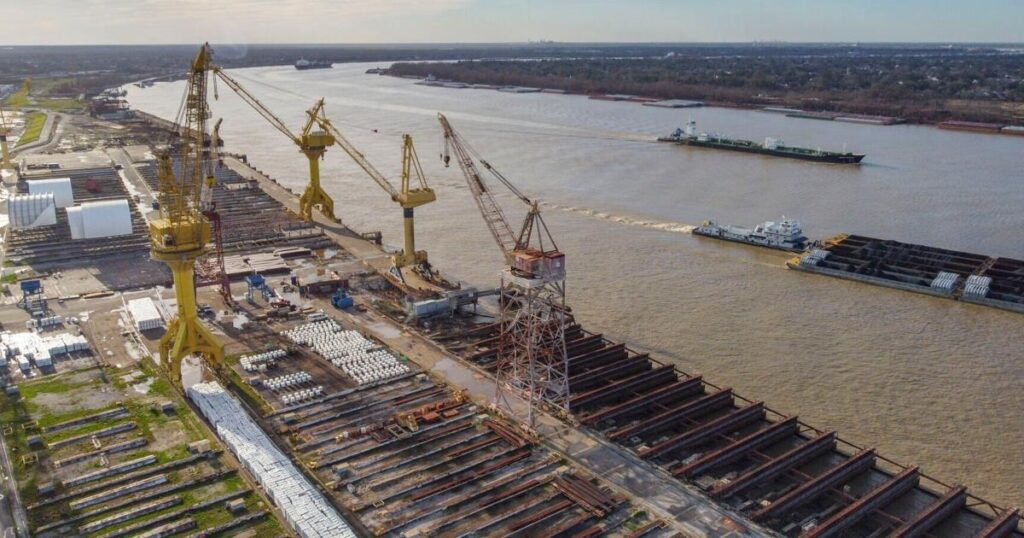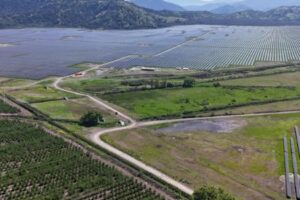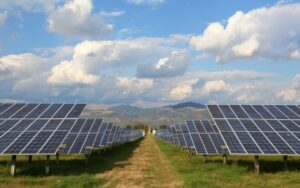Funding pause raises questions about Louisiana clean energy | News

The announcements have come at a steady drumbeat over the past several years. A $1.1 billion solar manufacturing facility will be built in New Iberia. A new offshore wind vessel was christened at the Port of New Orleans. Manufacturing plants are breaking ground up and down the Mississippi River to make inputs for electric vehicle batteries.
Louisiana officials from both political allegiances have welcomed everything from wind energy to controversial carbon capture projects as part of an effort to make the state a nexus in a new domestic supply chain for clean energy. Officials here hope it will move the needle on the state’s flagging economy.
Some Louisiana officials, nonprofits and economic development leaders have raised concerns, though, that the well for big clean energy projects could run dry.
Stephen Barnes, director of the Kathleen Babineaux Blanco Public Policy Center at the University of Louisiana at Lafayette, said the state has finally started to diversify its petroleum-based economy after decades of talking about it. Barnes conducted a study on behalf of First Solar, an Arizona firm that announced plans to build a $1.1 billion solar manufacturing plant in New Iberia, finding the plant will support thousands of jobs.
“The opportunity is now,” Barnes said. “It would be a real missed opportunity if we saw changes or even uncertainty at the federal level that would lead First Solar to reassess their plans and pull back on near-term growth.”
The funding pause has also ensnared a wide array of grants to the state, local governments, nonprofits and universities.
The Louisiana Department of Energy has received nearly $400 million from the Inflation Reduction Act alone, money it planned to use to put solar panels on homes, make houses more energy efficient and put oil industry employees to work capping leaky oil and gas wells. A spokesperson for the agency said it is telling contractors and subrecipients of the money about the funding pause while they seek guidance from the Trump administration to make sure “any ongoing work” aligns with Trump’s executive orders.
Republican Gov. Jeff Landry, a vocal Trump supporter, did not respond to messages seeking comment through a spokesperson.
New Orleans’ Office of Resilience and Sustainability has struggled to get clarity from federal officials on a range of grant programs they plan to use for expanded Blue Bikes, tree planting and electric vehicle charging stations.
Camille Manning-Broome, head of the nonprofit Center for Planning Excellence, which helped coordinate the drawdown of money from the Infrastructure Investment and Jobs Act and IRA during Gov. John Bel Edwards’ administration, said the money is crucial for diversifying the state’s energy portfolio and attracting investment.
“Any repeal or extended pause in funding from recent years could introduce uncertainty, disrupt supply chains and potentially undermine the billions in private investments already beginning to take root,” she said. “More critically, it would challenge the capacity of Louisiana’s energy sector to innovate, expand and remain competitive in an evolving global energy market.”
Despite reputation, drilling has fallen off in Louisiana
Efforts to promote U.S.-based drilling may not lead to huge changes in Louisiana, despite the state’s economy long revolving around oil and gas.
U.S. oil production is already at a record high and has been for several years. And oil companies have found ways to operate with fewer workers, meaning jobs in drilling aren’t expected to skyrocket here.
“Oil and gas production in the US is at historic highs right now,” said Greg Upton, executive director of LSU’s Center for Energy Studies. “Employment in those sectors has not grown with the growth of production. The reason for that is the story of efficiency.”
It’ll take time to figure out the exact impact of the Trump administration on clean energy, Upton said. But scaling back solar or wind production tax credits would almost certainly reduce the amount of investment in Louisiana at a time when a slew of companies are planning solar projects here.
On the other hand, not all the activity depends solely on federal aid. Many petrochemical companies here are embracing carbon capture and “clean hydrogen” — made by either using renewables or storing carbon dioxide underground — because they expect there will be a lucrative market for lower carbon-intensity products overseas.
“There will be a premium on low-carbon products in the future,” said Ryan Stiles, an executive with CF Industries, when he spoke to a state panel this week.
Tommy Faucheux, head of the Louisiana Oil and Gas Association, separately told lawmakers he doesn’t expect Congress to roll back subsidies for carbon capture established in Biden’s IRA.
Paul Schubert, CEO of Strategic Biofuels, said he’s not too worried about the funding pause because of the political support for the industry. His company is planning a $1 billion plant in north Louisiana to turn forestry waste into “sustainable aviation fuel” by storing CO2 underground.
And he noted that most of the projects, funding and jobs created from the IRA are headed to Republican districts.
“Are they really going to kill all of that?” he said. “I kind of doubt it.”
“If we were in EVs or maybe wind and solar, we’d probably be more concerned.”
First Solar, the company building a massive solar manufacturing site in New Iberia, hasn’t spoken publicly about the Trump administration’s position on renewables or the funding pause. The project was part of a wave of announcements aimed at weaning the U.S. off foreign supply chains for products like solar panels and EV battery inputs. And it relies on the IRA, with the firm selling $700 million in tax credits from the act last year.
State Sen. Blake Miguez, a Republican and Trump supporter whose district includes the First Solar plant, didn’t respond to requests for comment this week. Miguez is reportedly considering a run for U.S. Sen. Bill Cassidy’s seat next year.
What happens to projects in limbo?
Several key projects are directly paid for by the federal government, and the pause in funding raises questions about their viability.
Project Cypress, a controversial project that aims to suck CO2 out of the air in southwest Louisiana, received a $50 million grant from the U.S. Department of Energy to get started. The firms behind the project didn’t respond to queries this week.
Cynthia Robertson, head of the nonprofit Micah 6:8 Mission, also got funding as part of the Project Cypress project to help nearby communities navigate and benefit from the massive industrial project. But in late January, the funding stopped. Since then, she’s received a series of emails from the project coordinator saying they don’t have updates and to expect potential delays in funding.
Robertson said she hired a full-time staff member for the grant and has since had to shuffle money around to keep doing the work so she doesn’t fall out of compliance when the funding resumes.
“We’re keeping up our end of the bargain even though the federal government is not keeping up their end of the bargain,” she said.
State Rep. Joe Orgeron, a Larose Republican who has championed Louisiana’s role in the wind industry, said the funding pause and slew of executive orders are a “shotgun blast of sabre-rattling.” He expects whatever cuts come to be more strategic.
But he said Trump should know that oil services companies now have another industry in wind where they can work when the oil fields aren’t humming. And he said many of the big manufacturers in Louisiana need to make low-carbon products to remain competitive globally. Tax credits in the IRA support those efforts, he said.
“It’s more Louisiana jobs,” he said.





